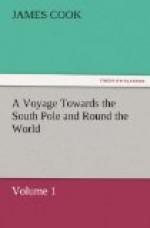In one of the canoes we had taken, was a chief, a friend of Mr Forster’s, who had hitherto called himself an Earee, and would have been much offended if any one had called his title in question; also three women, his wife and daughter, and the mother of the late Toutaha. These, together with the canoes, I resolved to detain, and to send the chief to Otoo, thinking he would have weight enough with him to obtain the return of the musket, as his own property was at stake. He was, however, very unwilling to go on this embassy, and made various excuses, one of which was his being of too low a rank for this honourable employment; saying he was no Earee, but a Manahouna, and, therefore, was not a fit person to be sent; that an Earee ought to be sent to speak to an Earee; and as there were no Earees but Otoo and myself, it would be much more proper for me to go. All his arguments would have availed him little, if Tee and Oedidee had not at this time come on board, and given a new turn to the affair, by declaring that the man who stole the musket was from Tiarabou, and had gone with it to that kingdom, so that it was not in the power of Otoo to recover it. I very much doubted their veracity, till they asked me to send a boat to Waheatoua, the king of Tiarabou, and offered to go themselves in her, and get it. I asked why this could not be done without my sending a boat? They said, it would not otherwise be given to them.
This story of theirs, although it did not quite satisfy me, nevertheless carried with it a probability of truth; for which reason I thought it better to drop the affair altogether, rather than to punish a nation for a crime I was not sure any of its members had committed. I therefore suffered my new ambassador to depart with his two canoes without executing his commission. The other three canoes belonged to Maritata, a Tiarabou chief, who had been some days about the tents; and there was good reason to believe it was one of his people that carried off the musket.




